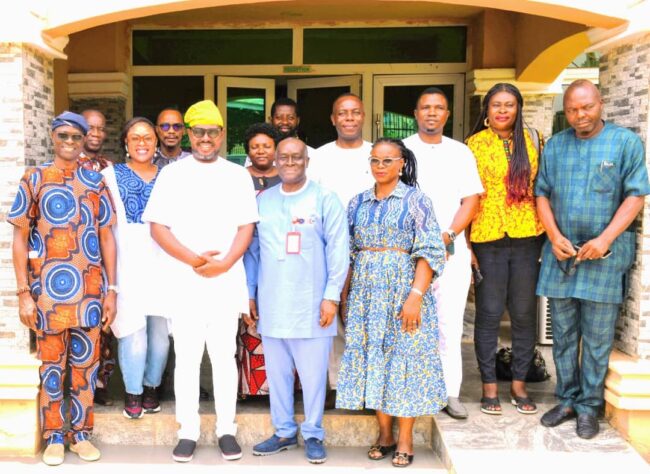The Medical Laboratory Science Council of Nigeria has said it will be inducting 317 foreign trained laboratory scientists who has passed validation examination conducted recently to reduce the effect of brain drain in Nigeria otherwise known as Japa syndrome.
This was disclosed by the Registrar of the MLSCN, Dr Tosan Erhabor, during Association of Health Nigeria Health Journalists (ANHEJ)’s courtesy visit to the MLSCN office in Abuja.
While speaking further, Erhabor also disclosed that there are presently over 45,000 qualified medical laboratory scientists in the country adding that some of the medical laboratory scientists have opted to seek for jobs abroad due to their inability to secure a place in Nigeria.
Erhabor also accused the hospital administrators, particularly in state-owned hospitals in the country of refusing to engage qualified laboratory scientists, preferring rather to employ substandard personnel.
According to him: “There are presently more than 45,000 qualified medical laboratory scientists, most of whom are not sufficiently engaged to carry out their profession in the country.
“Besides the Japa syndrome, where else will these people get work when administrators keep employing substandard workers to operate their facilities.
“Everyday we put up statements highlighting the dangers of quackery but they are not heeded. We have more than enough personnel to man these facilities and produce required results if properly utilised.”
On quality assurance certification to tackle quackery, Erhabor said the Council is currently implementing a quality assurance certification for all laboratory test facilities in the country to ensure that they meet required standards.
“The Council with the support of parent ministry – Federal Ministry Health and Social Welfare and other agencies is working to see that this effort comes to reality.
“As from April 21, the Council will be seeking for an approval by the Minister of State for Health and Social Welfare to embark on the re-accreditation of National External Quality Assurance in Zaria and the Invitro-diagnostic Laboratory in Lagos.
“The issue of quackery in Nigeria is becoming alarming, MLSCN is going to inaugurate a 7-man committee made up all stakeholders to recommend how we are going to tackle the menace of quackery.
“It is, not only those who were not trained as Laboratory Scientists that are quacks even a qualified person can also act as quack if he runs tests outside stipulated guidelines.
“The reason for taking these measures is to ensure that the test results being dished out from our hospital facilities are of standard.”
Moving forward, he said that MLSCN, the state Health Coordinators and the Dean of Medical Laboratory Sciences will have to form a synergy to implement more stringent regulation and ensure that inspection of facilities is carried out more regularly in order to drive quackery away from the profession.
He said that there is no doubt that the exodus of medical personnel is hitting hard on the country’s health sector. Come the next one month, about 317 new foreign trained Medical Laboratory Scientists will be inducted into the Nigerian medical system.
He added that as part of efforts to arrest the impact of the Japa syndrome, MLSCN is working in line with the directive of the Minister of Health will be pushing for an increase in the number of intake of students to study medical laboratory science in all universities in Nigeria.
He revealed that steps will be taken to improve on facilities and teaching personnel in the Medical Laboratory Science departments.
According to him, in the next four years what Nigeria will witness a bumper harvest in terms of the benefits accruing from efforts.
Earlier, the President of ANHEJ, Com. Joseph Kadiri, called for possible areas of collaboration with the Council in its fight against quackery, substandard products, and other vices through the media.
He added that the ANHEJ have been watching with the keen interest the position in terms of lab testing the council has put Nigeria with the accreditation of ISO17025 which makes labs in Nigeria not travel to achieve their aims.
“ANHEJ is willing to collaborate with the council in such a way that the activities of the council will be made known across the globe using the association’s various platforms,” he said.
